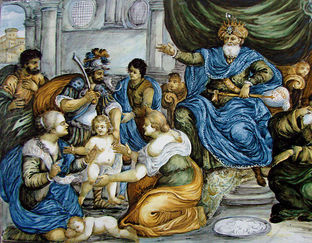 Salomon's Judgement Castelli_18th c.
Salomon's Judgement Castelli_18th c. *
I imagine the reader skipping my manifesto of good judgement with that old feeling of «I know, I know!" that of course, to have a good judgement you have a good logic.
Well, not so! Whoever reduces good judgement to good logic did not understand a thing from what I am trying to do.
Certainly, good logic - sound, coherent fact-based statements that follow and notions that make sense - are the very back-bone of Reason, of Rationality, that man-made tool which produces and maintains justified beliefs. This is the proven creed of our modern world and also one of the warrants of mental sanity we all accept; no need of particular wisdom for this, it is sufficient to be simply normal *.
Beyond this prise of Rationality which goes without saying, what I understand by "good judgement" is supplementary, quite different and particular by what is the object of wise judgement and the means used. The object of good judgement is the sphere of human interest and practice as it is experienced by us, humans, the real-life context of persons. "Good" judgement is carried out with actual psychological means of the human mind which we call "faute de mieux" common sense.
Good judgement - which we all share potentially - is thus the use of the entirety of our mental functioning to reason about the world and people in human words and representations and mentalese thought - when it is successful. This functioning is much richer that linear ratiocination.
The same rich functioning, when failing, ignorant, misused, based on faulty perception and prejudice, is rightly called bad judgement or stupidity. Unfortunately, correct logic is extremely stupid too when it is applied dryly to human reality.
Common sense is still less than studied, as much as I know. It was shunned by scientific research in the 20th Century; neglect which does not make it less real, vital and omnipresent. Looking down at "folk psychology" and theories of thought which are some of the major components of common sense, will not eliminate their processes from our functioning as human beings. The first to rediscover common sense thinking are, ironically, the creators of Artificial Intelligence; simply because they need to build machines that work in practice, not dogmatically correct logical devices.
Indeed, the simplicity of this common sense is a very complicated cluster of live thought processes, and for me to make simple. This turns into a specialist discussion. However, without understanding this complication we cannot improve our practical judgement to make it better.
*
Judgement is wise when it is aware of what is does and of its own limits.
Good judgement achieves to take into account the human life-world as rich as it actually is: flowing, fuzzy, contextual, socially interactive, guided by culture and directed by shared sense. It needs to consider the human point of view and social life's complexity without reducing it. In the end it is wise when it succeeds to conclude with practical solutions, in forms simple enough to make sense to people, useful for deliberation and for action.
We mainly access, this flow of reasoning, by itself, through our commonsense awareness that we think and of how we think. This awareness combines more means than one (logical and verbal) mode. As much as I learned, the comprehensive movement of lived representation and thought was never described by research scientists. It is easier to deny its very existence and declare it to be subjective “folk psychology", delusion or introspective rationalisation without solid measurable grounds.
If this is mere phenomenological belief, then let me dream and let you judge and understand otherwise. Inevitably, with your own conscious common sense. There is nothing else to rely on in our personal mind, ultimately, for all of us human knowers.
What "good judgement" is and does
I understand good judgement as a thought activity of a discerning mind which accepts as significant a large number of components vital for the real-life relevance of practical judgement and which achieves to integrate them in prudent reasoning:
Good judgement counts on the active presence in people's minds of clusters of ideas readily received - from solid common places to shared prejudices.
It involves thought habits built into the language structures, syntax and grammar.
It moves based on inborn and learned forms, turns of mind and metaphors, entire memory and life-experience references continuously present. Frequently, our judgement advances in the form of narrative, so that the credibility of feeling and emotion coloured narrative prevails over logical coherence. Wise thinkers are aware of this reality and make good use of it.
The challenge is to draw on all these resourced without being swayed by prejudice and bias. Checking and correction of such biases is crucial. The more the thinker is aware of these informal sources and short-cuts in use, of their weaknesses, bugs and limits, the higher the quality and freedom of the judgement.
Good judgement is situated by being of a thinker who has an identity and presence, among other people with identities that count, in specific situations, with specific interests and with an orientation towards specific human goals. This different from laboratory research. It is art, savoir faire and know-how practiced with rudimentary instruments. Only experienced masters of a craft, after a long learning curve and experience, are able to do such complicated work lightly and "naturally", seemingly empty-handed. I would say that their main tallent is to be aware of what they know and even more of they and other people do not know, able to evolve in conditions of ever present ignorance.
Good judgement requires awareness of our and other people’s inevitable trust in long chains of witnessing and mediated informing, the inclusion and consequential taking into account of values, feelings, beliefs unquestioned, incorrigible convictions, ignorances, denials, diverging interests and interpersonal or group transactions. The fast thinking of good judgement must have regard for biases and limits which need to be taken into account as facts.
All these - which I do not deplore but on the contrary account as unavoidable factors - are determining together the way judgement advances in our mind, to result in human-friendly comprehension, predictions and potentially wise, practical conclusions.
It is the accounting of situation and opportunity, the nuance and the human interest and point of view, which make judgement possibly wise.
The manner of such reasoning and its purposeful communication are thus significantly modified by complexity, imprecision and impermanence. We can keep track and supervise such complication – which additionally keeps moving - only intuitively, with the means of our representation and informal understanding. This mode of judgement is imprecise and less than respectful of linear logical treatment of artificially isolated issues, quite different from the way a logical device or a trained logician would be able to "process" data. Imprecise but powerful and timely.
Thanks heavens, we are still living, feeling selves, conscious and complicated to a degree of appearing unruly, unexpected, "free", able to start something new, our psyche is still not entirely reproducible by standard algorithms and micro-manageable by ultimate tyrannies.
Without including interpretations based on precedent, local knowledge and personal experience - culture and psychological functioning, given equal value and notice, good logic is no good enough in the real life of people and nations.
Good logic which, with a respectful bow, I can only admire and try to absorb into my common sense, is mandatory at the core of good conceptual thought and decision, particularly as a justification of decisions, as a public watchdog of realism and consistency; but it cannot replace the seamless connection, the immersion of the thinker in the informality of actual human reality.
Clean propositional logic cannot supplant the richness and finesse of judging with "good sense", nor its effectiveness. The internal core of (somewhat informal) proper logic so useful to educate, is surrounded, wrapped, assimilated, into awareness of the human side of our life-world, able to understand human reality as people live it or as they conceive to live it. Accordingly, people will tend to accept narratives, metaphors and shortcuts as making sense to them. One of the signs of possibly good judgement is its power to make things simple.
*
Good judgement takes place in an internal language of our mind which we share with all other humans, because our body structure, sensory functioning and neural processes are the same, of the same species. Thus we have and can understand in other minds the progress of common sense representations, notions and the readily available short-hand reasoning procedures, guided by prevalent acquired beliefs, validated by socialisation and precedent; when shared with other people, the exchange takes the form of communication people can understand, with content they can use. To counterbalance the imprecision of such short-hand and of such known bias “good” judgement requires some talent, intellectual competence and self-critical sense vital to continuous correction in order to advance from incessant approximations and some falsities towards sound conclusions; allowing intuitive judgement to unfold unchecked, would probably produce inept rubbish.
I claim that good judgement cannot be reduced to processing precise, clean, granted data, tested empirical knowledge and proven propositions; that material is too poor and mechanical. Judgement becomes "good" by achieving to consider the practical and artificial references, landmarks and informal procedures people use to position themselves, adjust, think and take everyday decisions, then to follow them in practice. This complicated process takes place imprecisely and quickly, in real time, on one's feet, on incomplete information, but it works quite well, better for the time being than the clean logic driven response of the best artificial intelligence, at least today. This was understood by the IT engineers faster than by the psychologists; now artificial intelligence works to imitate our "sloppy" efficiency in poorly defined fields.
The priority for good judgement is to connect, on time, relevant fact and action needed with that which counts and makes sense for people.
There is a willed bias in good judgement to advise and help the specific interest of specific people, like yourself, each with preferred values at work. Truth is not a matter of choice but the ways chosen to advance are voluntary, intelligent choices.
Good judgement is not meant to serve precision, perfection or truth above the human interest of living safe and better. The values taking precedence are usefulness, success, goodness, survival, life, peace, flourishing and the like.
What good judgement is definitely not is "pre-judgement", thought readily received or set in advance, to be forced upon local or new goals, circumstances and events. Reducing surprise to rigid past solutions, cutting down newness to the technically handy size and notions of dogma is contrary to good judgement. This is what all mechanization works to achieve; reduction to simple and cheap procedures, easy to deploy and control.
Forcing unruly, fuzzy reality-in-movement of thought onto a Procustean bed of hard and slow thinking rules set in advance, can only be foolish, not wise. It is like cutting its head or its feet. Generality imposed on the particular, dogma, utopias, are contrary to good judgement. They are usually absurd or stupid.
Good judgement is people-minded reasoning that functions in the actual Umwelt, the life-space of knowing and acting accessible to the human being. Judgement is good when it foresees usefully, without horses’ blinkers, a multiple choice of scenarios of that which may and will actually happen; it is good if it protects with prudence and it succeeds to help.
Good judgement is proven when it becomes a successful navigator of the everyday and also of the unexpected, of the exceptional, of the yet unknown.
If needed, good judgement provides means to create something new; new ways around obstacles, new interpretation and new names propitious to master things and events, instead of being dominated by them. If we are to build or create new reality it is by good judgement, certainly not by emaciated un-human utopia.
Moreover, by leaping on a higher orbit of n±1 thought when the given is not favourable, good judgement reframes and invents; it proposes unexpected action, not respecting the given rules, building new things non-existent yet but possible. To quote again my favourite from G.B.Shaw: "People see things and ask why. I dream of things that never where and ask Why not?"
Good judgement is watchful with the garbage-in garbage-out vulnerability of the formal procedures and processes of judgement. The wise thinker feels what to discard. It does not help at all to be precise and correct in processing and deciding, based on reality incompletely and poorly perceived or cluttered, poorly understood and misnamed; even less on dogmatic decisions ignoring the local the inconvenient, the human factor.
Good judgement starts with the quality of perception. It is false that all people perceive equally the same thing, that perception is passive; intelligent perception observes the relevant, the useful. The wise percievers attribute useful significance and propitious name to what they perceive. Wisdom of judgement starts at the entry point; interpreting one's own perception, mindful of the relevant at work, not reduced to habit, prejudice, to the politically correct or the scientifically correct pretence.
The miraculous, creative entry point of good judgement is to observe, with the adequate "granularity" with an open mind, to sense what counts and to name it or rename it in felicitous ways.
The "wise one" will understand better than other people what things mean here and now and also in the long term and a much wider view. This frame is higher or deeper, N+-1, thus freer that standard, precise but frozen definitions and propositions. I would say that often good judgement starts well indeed with a moment when the thinker exclaims "Aha!" when he suddenly sees falling into one meaningful picture the components of a Gestalt, a configuration where a useful itinerary makes sense. Observation limited by definitions and available instruments, presents choices often given to diminish choice or produced by disconnected stupidity.
If you want to read more about this second pillar of wisdom...
___________
* Exception from this, for the wise one, is only when everybody around is taken by madness. Then it is wise to adapt and survive.
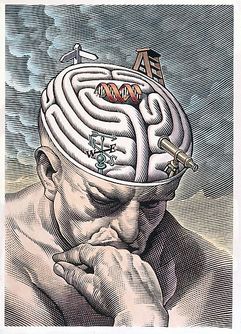



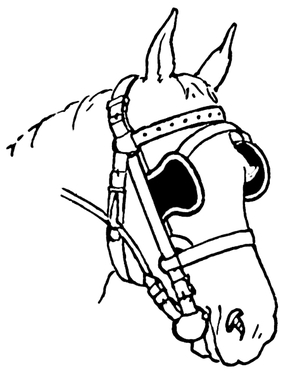
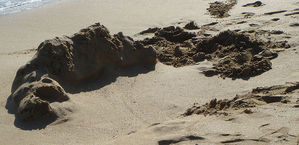


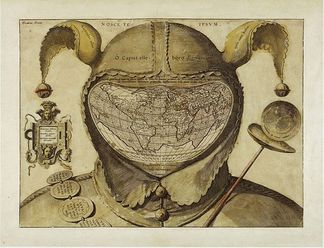
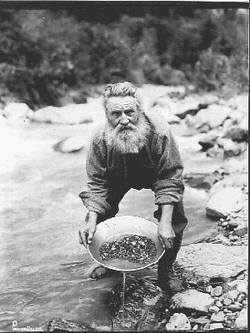
 RSS Feed
RSS Feed